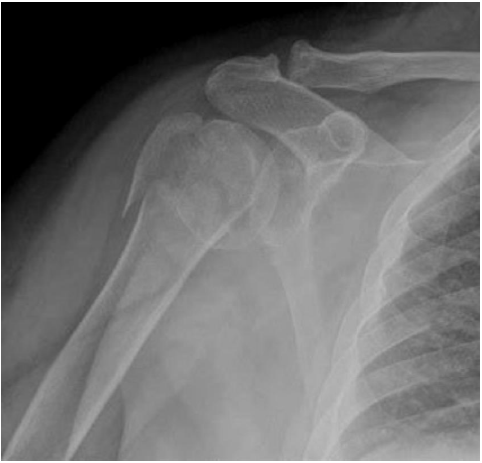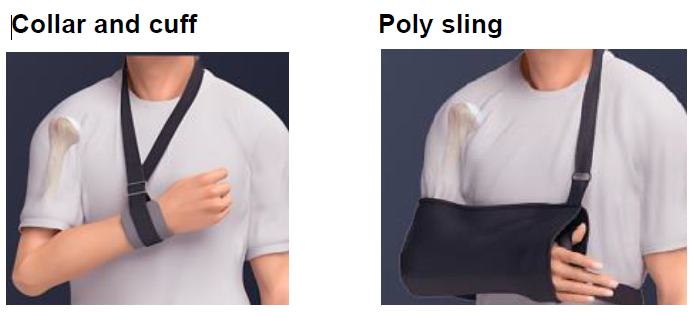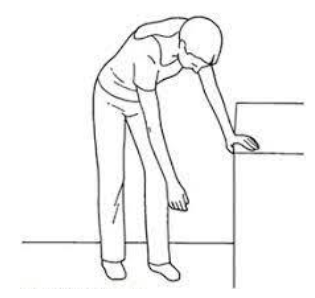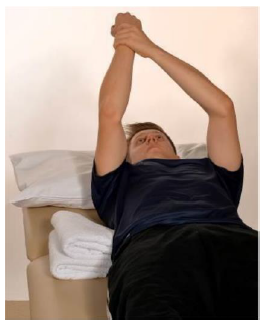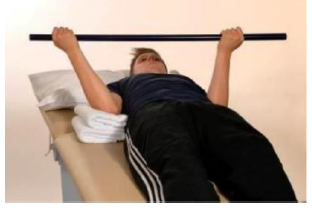Proximal Humeral fracture
This page answers some of the questions you may have about your humerus fracture. It also gives you advice and information about how to manage at home. The humerus is the bone in the arm between your shoulder and elbow. Your injury is a fracture to this bone, near the shoulder. There is often quite a lot of bruising and swelling of the arm over the first few weeks. This is normal and resolves by itself as the fracture heals.
If you have any concerns or worries following your discharge from hospital, please contact the Trauma Service.
Tel: 0300 422 5269
Monday to Friday, 8:00am to 5:00pm
What to expect
This type of fracture is often managed conservatively, meaning you do not need surgery.
You should not need a fracture clinic appointment or a further X-ray.
If you have not been referred to physiotherapy and are struggling to regain movement or function, you can self-refer. The contact details are at the end of this page.
Most people are given a collar and cuff to wear, however some may be given a poly sling instead.
You should wear the collar and cuff or sling for about 6 to 12 weeks. Your consultant will give you a more precise time frame.
When you wear the collar and cuff, your hand must be above your elbow. This is so that there is some weight pulling through your upper arm to keep the healing bone aligned correctly. This will make sure that the bone heals as well as possible.
If you are wearing a poly sling, your elbow should be at roughly 90 degrees. The elbow must be pushed back into the sling as far as possible and part of the hand must be supported by the sling. This is so that the sling does not press on the ulna nerve in the arm.
Pain relief
It is common to get pain from your shoulder and down your arm. Regular pain relief such as paracetamol is advised.
To help control the pain at night, keep the collar and cuff or sling on for 3 to 4 weeks to avoid any unnecessary movement. We also advise you to sleep on your unaffected side and use pillows for comfort.
You may want to place a pillow along your back to prevent you from rolling onto your affected arm during the night, and/or a pillow in front of you to rest your arm on. If you prefer sleeping on your back you can put a pillow under the elbow of the affected arm.
Washing and dressing
The collar and cuff or sling should be worn all day and night for 3 to 4 weeks. You should only take it off when you are washing and dressing or to do physiotherapy exercises.
To wash your underarm lean forwards and rest your unaffected arm on the edge of a work top or sink. You can do this sitting down for balance if needed. When getting dressed put your affected arm through the sleeve first, when getting undressed remove your unaffected arm from your clothes first.
Returning to normal activities
When you can return to your normal activities will depend on your symptoms.
Driving can be resumed when you are comfortable and safe to control a car. It is your decision as to when you are safe, but we would advise that you to not drive for at least 4 to 6 weeks following your injury. It is wise to discuss this with your insurance company.
As a rough guide:
0 to 3 weeks
You can use your arm for essential activities such as washing and dressing. Avoid weight bearing tasks such as pushing up from a chair, lifting, carrying, pushing and pulling.
4 to 6 weeks
Light house hold work such as cleaning, no lifting anything heavier than a cup of tea.
6 weeks +
Medium work but no lifting above shoulder level.
3 to 6 months
Heavy activities and physical work including above shoulder level.
Physiotherapy exercises
Initial exercises to start after you have been seen by the medical team in Accident & Emergency:
Neck movements
Turn your head to one side until you feel a stretch. Hold for 5 seconds. Repeat to the other side. Repeat 5 times, 3 times a day.
Elbow / wrist / hand movements
Try to keep these joints moving. Bend and straighten your elbow, rotate your wrist and make a fist and stretch your fingers out. Repeat 5 times, 3 times a day.
Pendulum exercises
Stand leaning on a table with your unaffected arm. Let your affected arm hang relaxed straight down. Swing your arm gently forwards and backwards, round and round, side to side. Repeat 10 times, 3 times a day.
Later exercises:
Start these exercises 4 weeks after the injury. If you have self-referred to physiotherapy, you should start these exercises when advised.
The following exercises should be done while lying on a bed:
Lying on your back, with the back of your affected arm supported using towels/cushions. Use your good arm to lift your affected arm up towards your head. Try to get your hands on top of your head if you can.
We would suggest you perform this exercise twice a day and do 10 repetitions as comfort allows.
Lying on your back with the back of your affected arm supported using towels/ cushions. Bend your elbows to 90 degrees and use a stick to turn your affected arm out to the side. Keep your elbows tucked in. Again, try to perform this twice a day and do 10 repetitions as comfort allows.
If you are seeing a physiotherapist, they will show you other exercises to progress on to, if needed. These will help you to regain your shoulder movement and gradually strengthen your shoulder muscles.
You will be given advice on how to continue your rehabilitation until you have made a good recovery back to all of your normal activities, work and sports.
General advice
Most of your recovery will be in the first 6 weeks following your injury. Please be aware that it can take 3 months or longer to recover your shoulder movement.
You may not recover all of the movement but for most people this will not affect their function very much. It usually takes up to a year to recover your shoulder strength.
Contact information
If you have any concerns or worries following your discharge from hospital, please contact:
Trauma Service
Tel: 0300 422 5269
Monday to Friday, 8:00am to 5:00pm
Email: ghn-tr.glostrauma@nhs.net
If you have any concerns about your progress, stiffness or weakness in your shoulder, please contact the Physiotherapy Outpatient Department at one of the locations listed below.
Cheltenham General Hospital
Tel: 0300 4223040
Cirencester Hospital
Tel: 0300 4216267
Evesham Hospital
Tel: 01386 502464
Gloucestershire Royal Hospital
Tel: 0300 4228527
Lydney Hospital
Tel: 0300 4218722
North Cotswold Hospital
Tel: 0300 4218815
Stroud
Tel: 0300 4218080
Tetbury Hospital
Tel: 01666 502336
Tewkesbury Hospital
Tel: 0300 4216133
